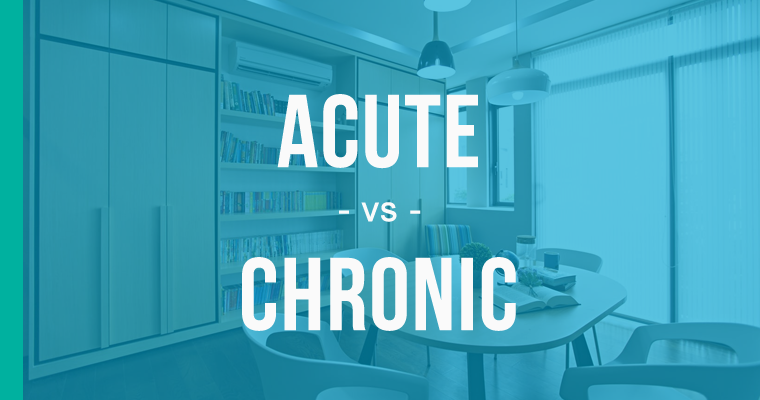Acute vs. Chronic – How to Use Each Correctly

What’s the Difference Between Acute and Chronic?
Contents
These words do not seem particularly similar at first glance. However, they both appear frequently in the context of medical conditions. Additionally, they both appear in collocations in the context of painful medical conditions.
Acute is an adjective that means intense or severe.
- The stunt man felt acute pain when he broke his elbow.
Chronic is an adjective that means occurring frequently or constantly over a period of time.
- She needs a lot of medication to manage her chronic pain.
Let’s look at the usage of these two words.
Using Acute in a Sentence
When to use acute: Acute is an adjective that means sharp, intense, or severe.
For example,
- He felt an acute pain after the removal of his wisdom teeth.
- The patient suffers from acute back pain that is so debilitating that she can barely walk.
- Sherlock Holmes was an acute observer; he noticed many small details.
- Her acute anxiety makes it difficult for her to take standardized tests without panicking.
- Many superheroes have an acute sense of justice that leads to them fighting the forces of evil.
- The student felt acute embarrassment when she answered the question incorrectly in front of the whole class.
Acute usually occurs in the context of pain. However, it can also appear in contexts in which sharp means keen or that relate to a very severe problem.
Using Chronic in a Sentence
When to use effect: Chronic is an adjective that means constant or recurring.
For example,
- My younger sister is a chronic whiner. She never stops complaining.
- The politician was forced to retire from office when his chronic alcohol abuse became public.
- The felon had a chronic inability to stay out of trouble.
- If you are experiencing chronic fatigue, you may need to see your doctor to find out if there is a more serious underlying cause.
Chronic typically appears in the context of pain or medical problems. However, people occasionally use it to describe other recurring types of negative behaviors.
The primary difference between an acute pain and a chronic pain is that an acute pain is severe and intense, it doesn’t necessarily last long or continually come back. A chronic pain is a pain that may be intense, but it is constant and continued.
Remembering Acute vs. Chronic
One way to help you remember the difference between these two words is to use their spelling, other definitions, and Greek roots.
Acute starts with the letter a, just like its synonym agonizing. Also, if you are familiar with geometry you know that acute describes an angle with less than 90 degrees. An acute angle is very sharp, which can remind you that acute pain is the same as sharp pain.
Chronic begins with a c, just like the words constant, continuing, and ceaseless. All of these words refer to something that lasts for a long period of time. Also, you can remember that chron is the Greek root word for time. This can help remind you that chronic pain is pain that lasts a duration of time.
Outside Examples
- Dan Gosling’s cross was headed away from the near-post by Vincent Kompany, only for Daniels to latch onto the loose ball and arrow a shot past goalkeeper Ederson and in off the crossbar from an acute angle in the 13th minute. –Houston Chronicle
- Customers who began a course of treatment before the change on Aug. 15 may still be still be able to receive in-network benefits, depending on the condition. The conditions that may be covered, in accordance with California law, include treatment for: acute medical or behavioral condition; a serious chronic condition; pregnancy, regardless of trimester; a terminal illness; newborn children from birth to 36 months; a surgery or other procedure that was authorized by Anthem or an HMO medical group prior to the termination date, and was schedule to occur 180 days after the termination date. –OC Register
- Inflammation happens after a joint is injured and swells, but similar chemical responses can occur over time throughout the body with unhealthy habits. That chronic, unseen inflammation can damage arteries and set the stage for clots. –New York Post
- People with chronic low back pain may feel it even more sharply if their spouses are critical and unsupportive of their condition, according to a recent study. –New York Daily News
Quiz: Chronic vs. Acute
Instructions: Fill in the blank with the correct word, either chronic or acute, in the correct form.
- I feel an _________ pain behind my eye. It just started and it hurts so much!
- My grandfather suffers from _____________ pain due to his arthritis.
- The parents felt exasperated with their children’s ___________ lying.
- The _________ problems from this administration are ceaseless!
- A good teacher will have an _________ awareness of her students’ needs.
See answers below.
Article Summary
Should I use acute or chronic? These words often occur in the same context, but their meanings are not the same.
- Acute is an adjective meaning sharp or intense.
- Chronic is an adjective meaning lasting a long time.
Don’t let the fact that these two words both usually refer to pain confuse you into using one when you mean to use the other.
Answers
- acute
- chronic
- chronic
- chronic
- acute
